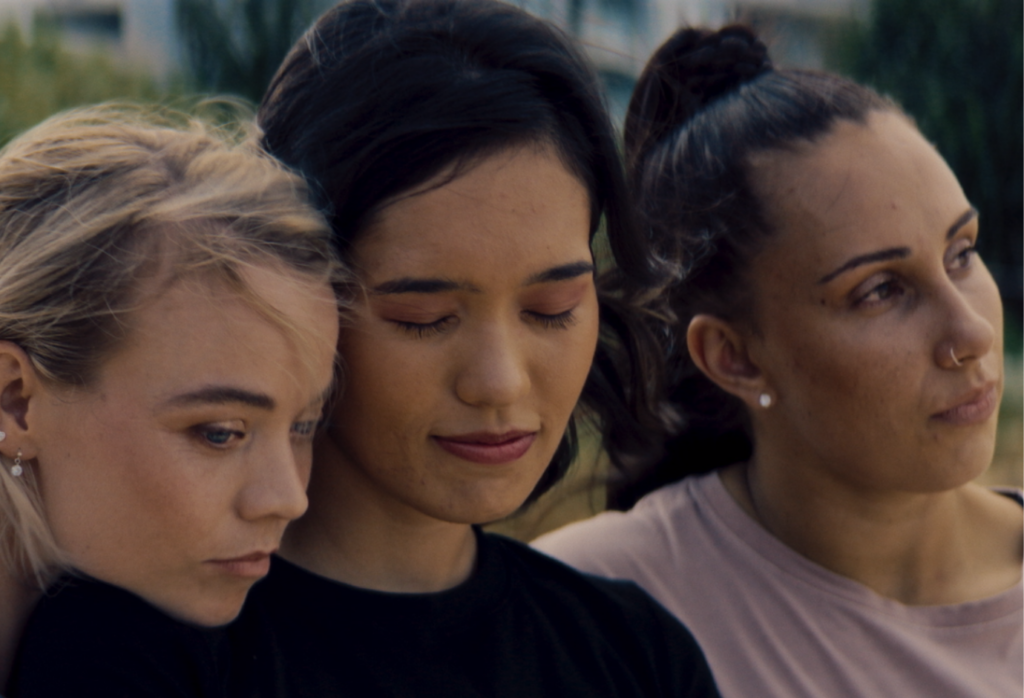In the ruthless world of competitive sport, women have persistently fought against inequalities including pay gaps, inadequate media coverage, funding and safety risks.
For former Australian representative sprinter, Jane Larkin, it was a world that desperately needed to be exposed in mainstream media.
The former athlete has spent the last few years working on bringing the story of women’s competitive sport to the big screen, forming her own production company 3Lite Productions to develop a film with investor support.
Last month, her directorial debut The Edge, had its world premiere at the Gold Coast Film Festival. Now, the film is streaming on Netflix. Larkin herself stars as one of the three protagonists in the film, which exposes the realities of navigating the world of elite sport as a young woman. It also stars Australian powerlifter Wiradjuri woman Lily Riley and Japanese Paralympic swimmer Mei Ichinose.
The source of the narrative came from years of their combined experiences — exploring a range of issues including performance pressures and politics, mental health, identity, and the abuse of power at the hands of powerful men.
As the producer, director and screenwriter, Larkin was keen to involve the experiences of athletes from marginalised communities, including First Nations, LGBTQIA+, and para-athletes.
“I grew up idolising male sports heroes on screen but never saw authentic female sprinters or the real stories of minorities in elite sport,” she said. “I trained among First Nations athletes, Paralympians, and LGBTQIA+ teammates. I started writing The Edge because I wanted to see those stories told.”
The film is a testament to her persistence and grit — something she learned as a young sportsperson.
“For years, I was told nobody would want to watch a film about female athletes, or a film about paralympic athletes,” she told Women’s Agenda. “The script was written over a long period of time but had its setbacks.”
Larkin said that she began sketching the idea for the film when she was 15. Throughout the years since, she has been chipping away at it, reshaping the story to reflect the nuance of her personal experiences.
“While I still believe I had something to say about the female athlete experience as a teenager, I’m proud of the way the script evolved, as I feel like I had more to say the longer I spent in competitive sport, and the more experiences I had as a citizen of the world,” she said.
Larkin describes switching between screenwriting and directing as “second nature” — but admits that she had underestimated the role of being a producer.
“It is essentially problem-solving,” she explained. “And it took me through a long and difficult journey as an indie filmmaker, with many ups and downs along the way. I believe we’re heading in a better direction, slowly but surely, and the success of female driven narratives like Barbie support that, as well as the fact that more people are tuning in to see the Paralympic games every four years, too.”
The cast features a dynamic mix of Olympians and Paralympians, including Olympic gold medalists Sally Pearson and Leisel Jones, Tokyo Olympian Riley Day, and Paralympian Braeden Jason.
Larkin said that making the film has expanded her knowledge of the range of issues women in sport face, such as para classifications, and cutting and bulking in powerlifting. She acknowledges there isn’t a single female athlete trope in elite sport.
“We’re not robots and it’s a mistake to think that women in sport are all the same,” she said. “I’ve gained a lot more knowledge and respect for female athletes in general, not just those in track and field, which was my discipline.”
Bringing the world of female sport to the screen also involves shining a light on the devastating struggles behind the sporting spotlight. Larkin explained that tragically, two of her former teammates have since died by suicide.
“That heartbreak demanded a place in this story,” she said. “As well as our challenges with mental health, body image, and identity. Like many female athletes, I experienced misconduct by those in positions of power. I needed to find a way to give voice to these truths. Not just for me, but for the women I trained with.”
Ultimately, Larkin wanted the film to represent a wide variety of both the female athlete experience, and the athlete experience as a whole.
“I hope audiences understand that this is a film about choice, and that was why it was important that each character chose something different in their personal, and sporting, journey,” she said.
“I hope we arrive at a day when female athletes are treated the same as their male counterparts. I hope the next generation of female athletes are told that they’re interesting beyond their bodies, or their sexuality, or their outfit choices.”
“I also hope they don’t have to be big on social media to get a sponsorship deal, and that the same opportunities are afforded to women as men when it comes to team sports, too – like AFL and Rugby.”
The Edge is now available to stream on Netflix ANZ.
Become a Women’s Agenda Foundation member and support our work! We are 100% independent and women-owned. Every day, we cover the news from a women’s perspective, advocating for women’s safety, economic security, health and opportunities. Foundation memberships are currently just $5 a month. Bonus: you’ll receive our weekly editor’s wrap of the key stories to know every Saturday. Become a member here.


